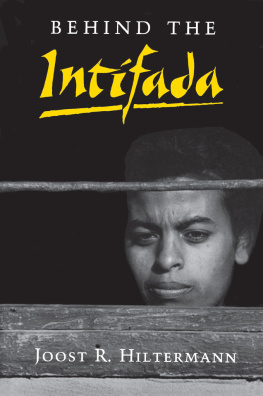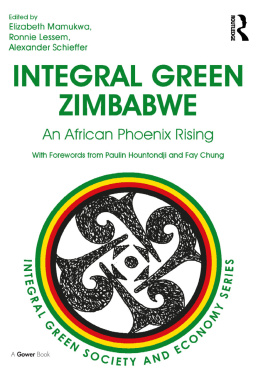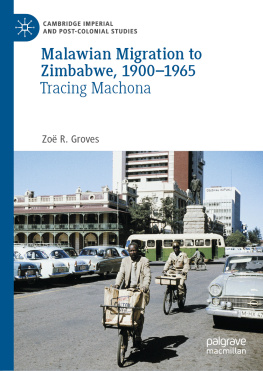Eastern
Africa
Series
_____________________________
REMAKING
MUTIRIKWI
Finalist for the African Studies Association 2016 Melville J. Herskovits Award.
The Mutirikwi river was dammed in the early 1960s to make Zimbabwes second largest lake. This was a key moment in the Europeanisation of Mutirikwis landscapes, which had begun with colonial land appropriations in the 1890s. But African landscapes were not obliterated by the dam. They remained active and affective. At independence in 1980, local clans reasserted ancestral land claims in a wave of squatting around Lake Mutirikwi. They were soon evicted as the new government asserted control over the remaking of Mutirikwis landscapes. Amid fast-track land reform in the 2000s, the same people returned again to reclaim the land. Many returned to the graves and ruins of past lives forged in the very substance of the soil, and even incoming war veterans and new farmers appealed to autochthonous knowledge to make safe their resettlements.
This book explores those reoccupations and the complex contests over landscape, water and belonging they provoked. The 2000s may have heralded a long-delayed re-Africanisation of Lake Mutirikwi, but just as African presence had survived the dam, so white presence remains active and affective through Rhodesian-era discourses, place-names and the materialities of ruined farms, contour ridging and old irrigation schemes.
Through lenses focused on the political materialities of water and land, this book reveals how the remaking of Mutirikwi's landscapes has always been deeply entangled with changing strategies of colonial and postcolonial statecraft. It highlights how the traces of different pasts intertwine in contemporary politics through the active, enduring yet emergent, forms and substances of landscape.
Joost Fontein is Director of the British Institute in Eastern Africa and Lecturer in Social Anthropology at the University of Edinburgh.
Published in association with the British Institute in Eastern Africa.
Praise for Remaking Mutrikiwi: Landscape, Water and Belonging in Southern Zimbabwe
Fonteins interdisciplinary approach as an anthropologist, a sociologist, an ecologist, and a historian provides further credence to his writings. Fontein may have opened the door for a whole new understanding of peoples and places. AFRICAN AFFAIRS.
Highly recommended, both for those interested in detailed analyses of (the impact of) land reform in Zimbabwe, as well as those interested in more theoretical debates about the significance of materialities in anthropology and history. ANTHROPOLOGY SOUTHERN AFRICA.
This is a story of a tangle of imminent pasts and imagined futures firmly rooted in the substances of Mutirikwi. Many audiences will want to journey through the pasts and futures of this book. INTERNATIONAL JOURNAL OF AFRICAN HISTORICAL STUDIES.
[T]his handsome volume helps readers to wrestle with the complexities of matter, experience, and time in southern Africa. Fonteins scholarship will interest students of African Studies, landscape, African history and historiography, materiality, development studies, and critical heritage studies. JOURNAL OF AFRICAN ARCHAEOLOGY.
Basing his book on extensive fieldwork, in-depth oral interviews, and an intimate understanding of the historical and social context, Fontein provides an exceptionally detailed analysis.... The moving stories of informants, vivid photos, and helpful maps make for an excellent work. Highly recommended. CHOICE
Eastern
Africa
Series
_____________________________
Womens Land Rights & Privatization in Eastern Africa
BIRGIT ENGLERT & ELIZABETH DALEY (EDS)
War & the Politics of Identity in Ethiopia
KJETIL TRONVOLL
Moving People in Ethiopia
ALULA PANKHURST & FRANOIS PIGUET (EDS)
Living Terraces in Ethiopia
ELIZABETH E. WATSON
Eritrea
GAIM KIBREAB
Borders & Borderlands as Resources in the Horn of Africa
DEREJE FEYISSA & MARKUS VIRGIL HOEHNE (EDS)
After the Comprehensive Peace Agreement in Sudan
ELKE GRAWERT (ED.)
Land, Governance, Conflict & the Nuba of Sudan
GUMA KUNDA KOMEY
Ethiopia
JOHN MARKAKIS
Resurrecting Cannibals
HEIKE BEHREND
Pastoralism & Politics in Northern Kenya & Southern Ethiopia
G NTHER SCHLEE & ABDULLAHI A. SHONGOLO
Islam & Ethnicity in Northern Kenya & Southern Ethiopia
G NTHER SCHLEE with ABDULLAHI A. SHONGOLO
Foundations of an African Civilisation
DAVID W. PHILLIPSON
Regional Integration, Identity & Citizenship in the Greater Horn of Africa
KIDANE MENGISTEAB & REDIE BEREKETEAB (EDS)
Dealing with Government in South Sudan
CHERRY LEONARDI
The Quest for Socialist Utopia
BAHRU ZEWDE
Disrupting Territories
JRG GERTEL, RICHARD ROTTENBURG & SANDRA CALKINS (EDS)
The African Garrison State
KJETIL TRONVOLL & DANIEL R. MEKONNEN
The State of Post-conflict Reconstruction
NASEEM BADIEY
Gender, Home & Identity
KATARZYNA GRABSKA
JOOST FONTEIN
Lost Nationalism
ELENA VEZZADINI
The Oromo & the Christian Kingdom of Ethiopia
MOHAMMED HASSEN
Darfur
CHRIS VAUGHAN
The Eritrean National Service
GAIM KIBREAB
Ploughing New Ground
GETNET BEKELE
Hawks & Doves in Sudans Armed Conflict
SUAD M. E. MUSA
Ethiopian Warriorhood
TSEHAI BERHANE-SELASSIE
Tanzanian Development *
DAVID POTTS (ED.)
Land, Migration & Belonging *
JOSEPH MUJERE
Land Tenure Security *
SVEIN EGE (ED.)
* forthcoming









